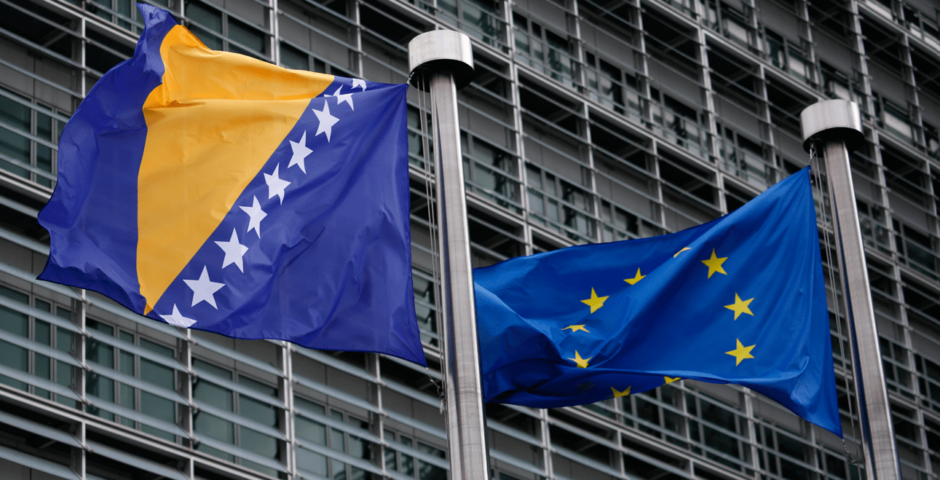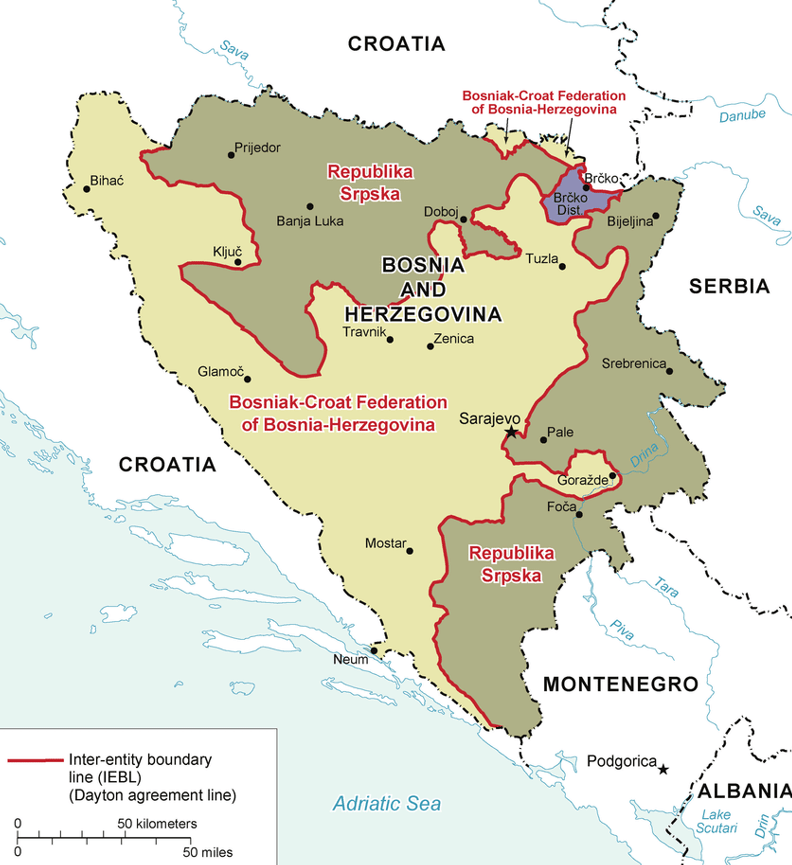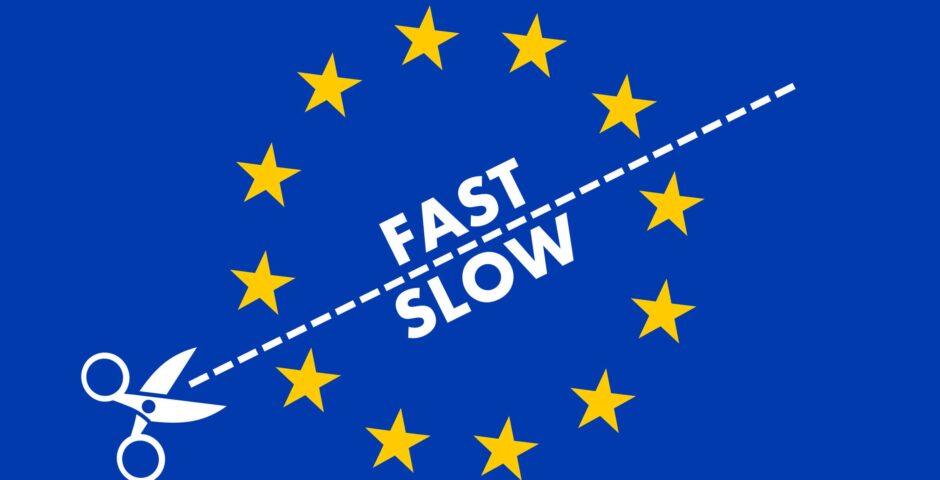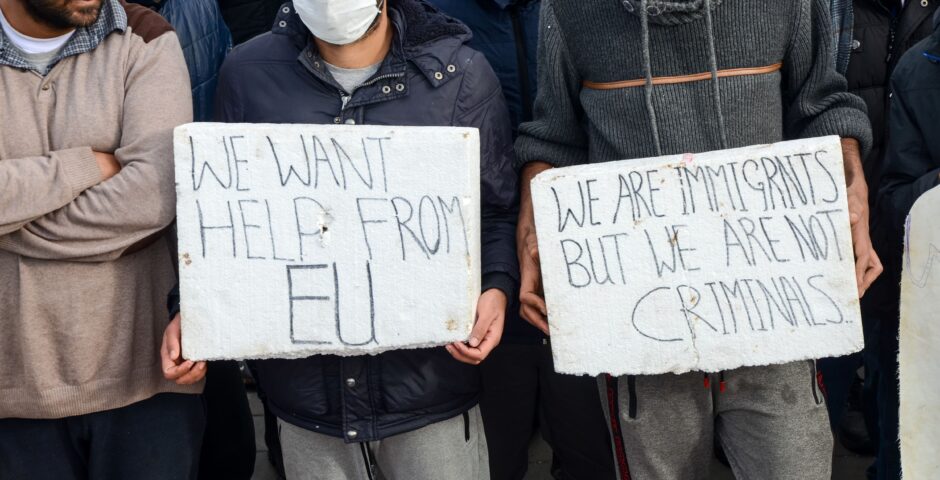The EU accession path for Bosnia and Herzegovina

Perks and challenges for Bosnia´s future.
In a recent speech delivered at the European Parliament, the president of the European Commission, Ursula von der Leyen, announced to the parliamentary members the Commission’s decision to open talks for the accession of Bosnia and Herzegovina to the European Union (EU). According to the latter, “Bosnia and Herzegovina has taken impressive steps forward” concerning its candidate status, highlighting that “more progress has been achieved in just over a year than in a whole decade”.
Bosnia and Herzegovina was granted candidate status in December 2022, after its formal request for EU accession six years earlier. Since then and for the last couple of years, Bosnia and Herzegovina has been implementing significant political and economic measures at a national level, as reflected in the Commission report published in November 2023. Among these, we can highlight the adoption of a new strategy on organised crime, an updated risk assessment and accompanying action plan on anti-money laundering, and several other strategies on illegal migration and counter-terrorism.
The Republic of Bosnia and Herzegovina (BiH): from “political deadlock” to European gateway
After its effective independence from Yugoslavia in 1995, the Republic of Bosnia and Herzegovina (BiH), one of the largest countries in the Western Balkans, has been territorially structured into two main parts or entities. On the one hand, the Federation of Bosnia and Herzegovina (FBiH), mostly populated by Bosnian-Muslims – Bosniaks – and Croats; on the other, the Serb-majority populated Republika Srpska (RS). These two territorial entities are constitutionally controlled by a multi-ethnic, asymmetric, complex structure that intends to protect the political interests of all these national groups.
BiH’s political system is established in virtue of four different tiers of governance: the State, which comprises the whole national territory and is in charge of most of the foreign, monetary, and international policies; the two entities, which will be provided with the competency to establish parallel relationships with other neighbouring countries; and the Canton and municipality levels.

Map of Bosnia-Herzegovina´s territorial entities (Source: ResearchGate)
Due to its multiethnic demography, Bosnia´s politics have been traditionally influenced by strong nationalistic demands, particularly after the rise of romantic nationalist movements in the 19th Century in Europe. After the signing of the peace agreement that ended the Bosnian War in 1995, a new tripartite governing coalition came up to power in September 1996. Since then, tensions between national groups have risen, particularly between Bosniaks and Serbo-Bosnians, regarding their respective degree of decentralisation and right to secession.
With the celebration of the last elections held in Bosnia in October 2022, three new leaders came up to BiH’s Presidency, in representation of these three main ethnic groups: Željka Cvijanović, as representative of the Serbo-Bosnians; Denis Bećirović, as leader of the Bosniaks; and Željko Komšić, on behalf of the Bosnian-Croats.
The high degree of decentralisation within BiH’s political system has, at times, led to endemic corruption – the lack of coordination and transparency across the four legal systems arguably facilitates this corrupt behaviour – nationalistic clashes, and public inefficiency. Notwithstanding these internal problems, Bosnia-Herzegovina has been taking important steps forward to improve its public institutions, particularly concerning its political, judiciary, and electoral systems.
Commission´s assessment
In its 2023 review, the European Commission (EC) highlighted some of the challenges that BiH´s Presidency has yet to address to become a fully EU-recognised member state. Among the recommendations published in this report, the EC pointed out 14 key priorities that should be implemented by the Bosnian state. These priorities ranged from diverse areas such as strengthening the rule of law, fundamental rights protection, and democratic implementation. Following the EC´s opinion on these priorities’ implementation, positive developments have taken place at the national level, while more negative developments have happened at the level of the Republika Srpska.
In declarations offered at the Stabilisation and Association Council meeting held in Brussels last year, High Representative Josep Borrell announced the possibility of serious consequences for the government of Republika Srpska in case further “provocative actions” were taken. As the High Representative stated, RS’ actions demean Bosnia´s sovereignty, unity and territorial integrity, damaging its international perception as a country.
These words came after RS´ executive power, led by incumbent president Milorad Dodik, called for the national Constitutional Court board to resign while aiming for the Court’s decisions to not be applied. This controversy took place after the Constitutional Court decided to quash several legal and political acts issued by the RS government, which, in the tribunal´s opinion, endangered legal certainty in Bosnia. According to the US embassy in Sarajevo, RS’ decision was considered a constitutional breach of the judiciary power, as well as a ‘reckless attack’ on the 1995 peace agreement.
The European Enlargement Policy (EEP)
Despite positive developments regarding Bosnia-Herzegovina’s EU candidate status, accession talks will only happen by following the 14 priorities required by the Commission. In this context, it is worth asking how the EU has fostered these accession processes historically.
Since the first EU enlargement event occurred in 1973 from its 6 initial members, successive waves of European enlargement have occurred until 2013, when Croatia’s accession happened. According to the European Union Council’s website, EU enlargement is “the process whereby states join the European Union after they have fulfilled a set of political and economic conditions”. These conditions are referred to as the “Copenhagen Criteria”, as they were set by the Copenhagen Council in 1993. They read as follows:
- “The stability of institutions guaranteeing democracy, the rule of law, human rights, and respect for and protection of minorities;
- A functioning market economy and the ability to cope with competitive pressure and market forces within the EU;
- The ability to take on the obligations of membership, including the capacity to effectively implement the rules, standards, and policies that make up the body of EU law (the ‘ acquis ’), and adherence to the aims of political, economic, and monetary union.”
In virtue of these rules, Bosnia would currently have limited capacity to get inside the EU bloc in the short term, as further reforms in points ‘a’ and ‘c’ are needed.
Neighbouring candidate countries: current status and expectations of membership
The path to accession for other neighbouring countries has not been easy. As the longest-standing candidate, we find Türkiye (formerly known as Turkey). Applicant since 1999, the Turkish state has been in accession negotiations with the EU institutions since 2005. However, continued cases of democratic backsliding, problems in the application of the rule of law, and defective protection of fundamental rights have put these accession negotiations at a standstill since 2018.
The second oldest applicant is the Republic of North Macedonia. Candidate member since December 2005, the Council decided to open accession negotiations with the country in March 2020. Almost two years ago, in July 2022, an intergovernmental conference took place to present the next steps of the North Macedonian enlargement process.
During the decade of the 2010s, three more countries applied for this EU membership: Montenegro (2010), Serbia (2012 ), and Albania (2014). To this day, none of these Western Balkan countries have acquired EU membership status, even though Albania’s bid for membership has recently been coupled with the one of North Macedonia for their joint accession since 2022.
In the last years, three more countries have formally requested EU accession. Ukraine, whose candidate status was granted just a few months after the escalation of war with Russia, in July 2022; Moldova, whose accession negotiations started in 2023; and Georgia, whose bid was added to the others´ in November last year. On top of this, one more European state has applied for EU membership without success: Kosovo. Applicant since 2022, its limited recognition as an independent state hinders its candidature process and expectations of adhesion.
Conclusions
Von der Leyen´s words regarding BiH´s opening accession talks should be taken with moderate enthusiasm. As High Representative Borrell put it in a recent article, “Candidate status is not the final destination, but rather the beginning of a new chapter”.
For the last few years, Bosnia has been implementing reforms in different areas, such as the combat against money laundering, the reform of the electoral system, and the fight against corruption. These are just some of the conditions required by the EU to give the green light to BiH´s way to EU membership.
In a context of increasing tensions with Russia, and with the idea of building a stronger, more united Europe, both BiH and the EU should encourage political dialogue among parties, in order to reinforce this process.
The lack of a strong, national commitment from Bosnian political elites, or the EU´s institutions’ support in this regard, could jeopardise BiH’s chances for EU accession. In this sense, all the positive developments acquired until the present might fall into a “bureaucratic nightmare”, as has been the case for other candidate countries in recent years.
Only a real will for European integration from all parties involved, as well as for European prosperity and peace, might ensure Bosnia and Herzegovina’s prospects of becoming a full EU member state in the future.
Enrique is a Master´s graduate in International Relations at Institut Barcelona d’Estudis Internacionals (IBEI). For the last few months, he has been working as an External Relations assistant for the EU Agency for Law Enforcement Training (CEPOL). Currently, he writes about politics, international conflict, and global security threats.
Header image: Shutterstock
In-text image: ResearchGate




